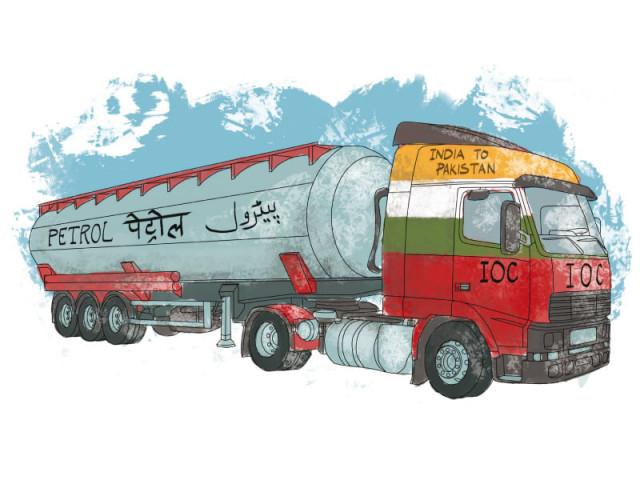Misconceptions about MFN: Trade liberalisation may not be death knell for Pakistan
As the debate surfaces again, there are supporters and detractors on both sides .

As the debate surfaces again, there are supporters and detractors on both sides . ILLUSTRATION: JAMAL KHURSHID
With the new government in power, there is once again a lot of debate on the issue of trade with India and the process of further liberalising trade regime after granting MFN status.
While there are supporters of this on both sides, there are still a lot of detractors who believe that MFN status, and opening up trade with India will be bad for Pakistan.
Many say it will be a death knell for the Pakistan economy.

The actual situation is not really that extreme. Perhaps one reason for this opposition is the fact that many people think that MFN status means giving special status to a country and as a result imports with no duties or no regulatory controls.
That is not the case. MFN status only suggests that for trade purposes a WTO member country will not be discriminated with other member countries. Any privileges that may or may not be accorded to that country are at the discretion of the respective governments.
Some of the biggest opponents of liberalising trade with India are in the industrial sector and in agriculture. From industry, the usual argument is that we are still an undeveloped and nascent industry and opening up the local market to Indian good will hurt the domestic sector.
The flip side to this argument is that Pakistan has for the most part been able to survive the onslaught of an even bigger manufacturing giant, China, we should be able to handle India.
But a lot of local industrialists are also drooling at the prospects. Local textiles hope to do very well in India as does the Pakistani shoe industry.
While the auto sector at large may be worried about cheap Indian imports, especially bike-makers which are mostly in the SME sector, Pak Suzuki looks to be welcoming the move because it hopes to revive the Alto once trade with India opens.
Then there are also those who oppose the opening of trade because the balance of trade will weigh heavily in favour of India. But this is primarily because while India granted MFN status to Pakistan many years ago, it did not really do much to remove non-tariff barriers which are still a bone of contention between the two governments.
Unless these barriers are removed, and Pakistan moves forward, the net-gainer will be India. This is something that needs to be kept in mind by all those in favour of trade liberalisation.
One of the most significant concerns raised by detractors is strategic. They say, and to a degree rightly so that the delicate relationship between India and Pakistan and the ever-present risk of a conflict are valid reasons for limiting any kind of economic dependence on India.

The increased flow of manpower across the border is cited by the same critics saying this will increase the risk of infiltration. In India, such apprehensions regarding the gas pipeline crossing Pakistan have also been shown.
However, one also has to take into account that the entire bulk of imports from India will not be detrimental to our economy or be disadvantageous to us. A lot of these imports, if they are cheap enough will simply replace imports from other countries. This is especially the case with auto parts, pharmaceuticals and electronics.
We also have to keep in mind that being a predominantly import-based industrial economy, cheaper imports will in the long run mean lower costs for our industries. The two main beneficiaries in this situation will be the end consumer and the government in the form of revenues.

And one has to keep in mind that the opening of trade in no way suggests unrestricted flow of goods. And the consumer is also a part of the Pakistan economy. Why do we disregard any benefit to the consumer as no benefit at all? So if some Indian goods are cheaper than domestically produced items even after paying import duties, why not allow them?
Published in The Express Tribune, July 22nd, 2013.
Like Business on Facebook, follow @TribuneBiz on Twitter to stay informed and join in the conversation.


















COMMENTS
Comments are moderated and generally will be posted if they are on-topic and not abusive.
For more information, please see our Comments FAQ